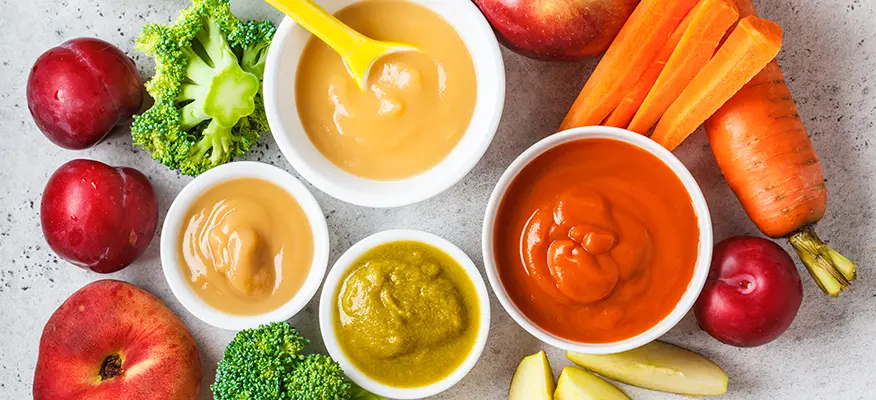Healthy Fats For Infants: Where To Get Them and Why They’re Important

Key Highlights
- Fat is an important source of energy in the body.
- Every baby requires fats to stimulate growth, but understanding the difference between good and bad fats is critical for a balanced and healthy diet.
- Fats are nutrients found in food that the body needs to build nerves, and hormones, and provide energy.
- However, if fats are not used as energy, they are stored in the body within fat cells for future use.
- They add a rich texture and flavor to food, but they are high in calories and can cause health problems if consumed in excess.
- This is why parents must understand the distinction between good and bad fats.
Fat plays a crucial role in providing essential nutrients and energy for a growing baby. During infancy and early childhood, when rapid growth and development occur, the body requires a significant number of calories relative to its size. Fat is an important source of calories, containing more than twice as many calories per gram compared to proteins and carbohydrates.
Parents have been looking for ways to feed their babies a healthier diet for years. From searching for a healthier alternative to cow milk for babies to finding the best hypoallergenic formula. However, did you know that there are healthy fats for infants?
Fat is one of the most frequently discussed nutrients in our diet. While there are many different perspectives on fats in an adult diet, there is no doubt that fats – including what kinds and how much – are critical for a child’s diet.
Fat is a necessary nutrient that plays numerous roles in the growth and development of infants. Fats can be found in a wide range of foods that are at opposite ends of the health spectrum.
Here’s what you need to know about healthy fat for infants, as well as where to find it.
Fat is important for babies
Fat plays a vital role in a young child’s diet and should constitute a significant portion of their caloric intake.
The body burns fat for fuel, but it also stores fat cells for later use. Fat is used by the body to insulate organs, produce hormones, and protect nervous system tissues. Fats are also important for growth and weight gain in babies.
Good fats are necessary for growth and serve as ‘nutrient enhancers’. They promote brain development, healthy bones organs, can even aid in immune system maintenance! account the majority of myelin (a fatty coating on nerve cells that helps babies think quickly) help fuel brain’s memory learning centers. It also aids absorption fat-soluble vitamins such A, D, E, K, which essential components a diet. Furthermore, because high calories, small servings will suffice. it contains DHA, acid, one omega-3 acids, increase immunity function, well keep your eyes, hair, skin, nails healthy. Fats be found foods avocados, soy products, olives, nuts seeds, plant oils. variety processed packaged snacks, baked goods, fast food items. is, however, critical to monitor baby’s consumption.
Infant Fat Requirements
- Breast milk and infant formula are important sources of fat for newborns and infants. In fact, they provide 40-50 percent of the calories needed for infants during their first year of life.
- Between the ages of 2 and 6 months, body fat increases twice as much as muscle. As a result, in the early stages of life, fat may be more important than protein.
- Fat restriction before the age of two is dangerous and should be avoided. One-year-old babies should consume approximately 40% of their calories from fat.
- The importance of fats from healthy fat sources other than breast milk and infant formula may be introduced to infants between the ages of 4-6 months.
- Indeed, mashed avocado, flaxseed, pureed vegetables with a small amount of olive oil, and baby oatmeal with thinned peanut butter are all examples of healthy fats that can be introduced as first foods for infants. Including a source of fat in every meal is a good rule of thumb to ensure your child’s dietary intake is well-rounded and includes essential nutrients.
Tips to ensure your infant is getting healthy fats
Provide your baby with high-quality fat sources
Do not restrict fat in your child’s diet until he or she is two years old. This means that unless otherwise directed by your healthcare provider if your child is transitioning from breastmilk or formula to cow’s milk, choose whole-fat varieties. And include plenty of mono- and polyunsaturated fats (adjusted for texture), such as fish, eggs, seeds, nuts, and avocado.
After the age of two, he should be following healthy eating habits like yours, which include whole grains, fruits, vegetables, low-fat dairy, and other protein-rich foods, as well as high-quality fats in moderation.
Limit saturated fat
- Because red meat, eggs, and full-fat dairy products contain other important nutrients, the goal is to limit them to a few times per week while favoring healthier unsaturated fats.
- Unless otherwise directed by your child’s healthcare provider, continue to choose whole milk (after age 1) and other full-fat dairy products, such as yogurt and cheese (after 6 months), until your child’s second birthday, as these provide the fat and calories required for his growth and developing brain.
Avoid trans fats
- In 2015, The FDA banned partially hydrogenated oils, the main source of trans fats. This new regulation requires most food manufacturers to comply. While this is excellent news for your health, it is still critical to read the labels. Look at the nutrition facts panel to see if a food product contains trans fats.
- Include plenty of essential fatty acids, particularly DHA (Docosahexaenoic Acid). Breastfeeding mothers and young children should consume 225 grams to 280 grams (or 2 to 3 servings) of mercury-free fish each week.
- Wild salmon, tilapia, cod, shrimp, catfish, canned light tuna, and pollock are all low mercury fish. Shark, king mackerel, tilefish, swordfish, and big eye or tuna are all high mercury fish.
Consume more of ‘good’ fats
- Fat-rich vegetables like olives and olive oil, canola oil, avocados, peanuts, and peanut oil, nuts (such as almonds and walnuts), nut butter, nut oils, seeds, seed butter, and seed oils, and fatty fish are all good sources of mono and polyunsaturated fats (such as wild salmon and trout).
Take note of the portion sizes
Because fats contain more calories than proteins and carbohydrates, they should be consumed in moderation by anyone over the age of two. While high-quality dietary fats have numerous health benefits, it is still critical to limit your total calorie intake.
Are you still wondering how to incorporate healthy fats into your baby’s diet? Well, here are some practical suggestions for increasing good fats:
- Sweet Potato Puree with Thyme and Butter
- Puree roasted carrots, vegetables, and butternut squash with white fish and olive oil
- Pureed Apples, Pears, and Plums with Coconut Oil
- Broccoli, pear, and spinach in chicken broth
Conclusion
So, the bottom line is, fats are essential nutrients for the body, and healthy fats for infants are especially important for babies.
The importance of lipids in your infant’s diet is important for you to understand. Fats not only provide energy to the body, but they also help support critical body functions.
Your infant is growing every day and using the fuel you provide to become bigger, stronger, and smarter, so incorporate good fats whenever possible! And when you need a quick fix, we’re here to help, making baby food blends that are as fresh as you can get without having to make them yourself!
However, as we have seen, not all fats are created equal, and some are unquestionably superior to others. Your little one will naturally receive the healthy fats they require by eating a varied diet of fresh, whole foods, lean proteins, oily fish, and non-hydrogenated oils.



